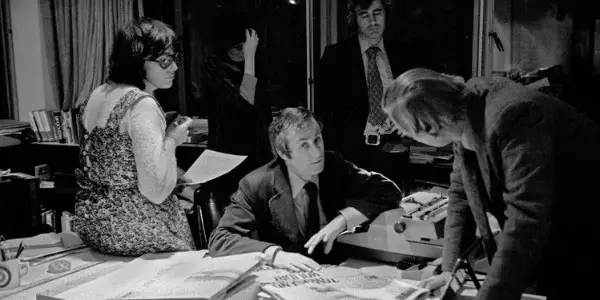ATTACKING THE DEVIL: A Corporate Horror Show Recounted With Craft And Humanity

Arlin is an all-around film person in Oakland, CA. He…
The world is a terrifying place. Its machinations are convoluted constructions managed by a mixture of public servants or private business people whom we would like to assume have the public’s best interests at heart, but whose true motives are more dubious and difficult to discern. Oftentimes financial imperatives outweigh common sense, and the result is disaster on a massive scale. More recently, this was evidenced by the global financial crisis of 2008, but for those of a certain age in the UK, the word “thalidomide” is the embodiment of corporate greed at the expense of public well-being.
Jacqui and David Morris’ new film Attacking the Devil: Harold Evans and the Last Nazi War Crime seeks not to reveal the series of poor decisions leading to the release of one of the most dangerous prescriptions drugs of the modern age, Distaval, for that was achieved during the heart of the crisis by Harold Evans, Editor in Chief of The Sunday Times. Nor does it merely recount the herculean effort by Evans to affect British law and put an end to this tragedy using journalism as a weapon.

Rather, the film quite cleverly uses Evans as a contextual portal to the whole sordid affair, from the drug’s test trials to the lives of its ultimate victims, and touching on the consumer boycott that took down an institution, as well as the surprising historical context of thalidomide’s invention.
Taking a fine touch to a complex story
The film opens with a disclaimer at saying that “Distillers”, the manufacturer of Distaval, no longer exists and the current owners of its assets claim no responsibility for the thousands of lives warped by the drug’s use; in doing so sets the viewer up for something calamitous before any footage has rolled.
It is probably a necessary tactic for the film to creating this slight sense of a looming darkness to come, mentally preparing us for the first baby to suffer deformities as a result of pre-natal Distaval use, who was born without ears. That Distaval was prescribed specifically for morning sickness, and that it was so effective as a treatment, guaranteed maximum impact on those who could be most adversely affected, resulting in over 100,000 cases of malformation.

Attacking the Devil feels like a very English documentary; a serious film on a serious topic with no flash, but also little emotional manipulation. One of the film’s most powerful interviews is with Sadie and Dominic Galvin, one of the pairs of mother and son whose lives were irrevocably touched by thalidomide. What in the hands of a more exploitative film might have been done with added emotion, the Morrises let their subjects alone to merely give them a platform to speak; their mere presence in the film together is evocative enough.
Attacking the Devil should be commended for making the effort to include direct, primary voices from the time, when the story could have easily all been told from the perspective of journalists and historians, an easier but less fruitful route. Some of the most affecting footage is an archival clip of a dad and his thalidomide-affected son out grocery shopping, showing all the parade of stares they had to endure on a daily basis.
Yet there is no getting away from the fact that Harold Evans is the film’s anchor, and it is his struggle to expose the thalidomide debacle that forms Attacking the Devil‘s moral backbone. Evans, bolstered by the success of his cervical cancer campaign to allow for pap smears in the UK, employed a “drip drip drip” approach, essentially death by a thousand newspaper-cuts, in order to increasingly build a public outcry.

Without getting into too much detail, the film chronicles how his journalistic decisions at The Sunday Times helped to change the law that prevented journalists from reporting and cases still before a judge, setting the stage to win justice for thalidomide victims who otherwise would have been denied compensation by draconian regulation.
Summation
Living in time of Zika virus, it is horrifying to contemplate a similarly devastating series of birth defects occurring from something entirely man-made and completely preventable. We like to think we have learned the lessons on the thalidomide disaster and that we can trust regulators to keep everything in check, but there will inevitably be slip-ups, and sometimes on a grand scale. Whether natural or invented, a free and thriving press is vital to exposing such calamities, and preventing similar ones in the future.
Just as it can be taken as a given that those at the top don’t always have our best interests at heart, Attacking the Devil makes it clear that there will also be those in a position to hold those forces at bay. Harold Evans helped introduce the concept of long-term journalism that still aims to expose institutional injustices, such as the recent Making A Murderer.
A pillar of integrity, Evans charged ahead despite Distillers, the manufacturers of Distaval, being large advertisers of The Times; he also resigned from the paper in 1981 after it was bought by Rupert Murdoch. If I have one minor gripe with Attacking the Devil it is that it is unnecessarily framed around a lecture that plays as a kind of low-tech Ted talk, where Evans retells the story to be depicted through the very film.
However, it is a story that demands to be told and one that hopefully will insure a long future for protectors of the public good.
What other documentaries have educated you about corporate malfeasance?
Attacking the Devil was screened at several documentary film festivals in 2014 and 2015, and was finally released in the UK on January 22, 2016. Screenings throughout the UK are listed here.
https://www.youtube.com/watch?v=jAvamLakz4g
Does content like this matter to you?
Become a Member and support film journalism. Unlock access to all of Film Inquiry`s great articles. Join a community of like-minded readers who are passionate about cinema - get access to our private members Network, give back to independent filmmakers, and more.
Arlin is an all-around film person in Oakland, CA. He received his BA in Film Studies in 2010, is a documentary distributor and filmmaker, and runs Drunken Film Fest Oakland. He rarely dreams, but the most frequent ones are the ones where it's finals and he hasn't been to class all semester. He hopes one day that the world recognizes the many values of the siesta system.













